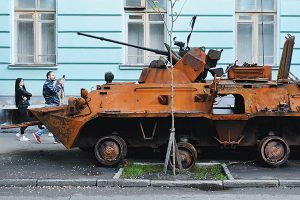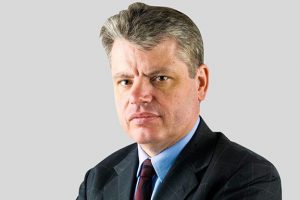When the global elite meets at the Swiss resort of Davos, for a spring gathering of the World Economic Forum (WEF), war will have forced its way to the top of the agenda.
The pandemic has shrunk the annual jamboree of the great and the wealthy. Absent will be Russian oligarchs who hung around in “outer Davos†mostly uninvited and yet heavily present in private chalets and meetings. Now they’re under Western sanctions and under the radar.
That has ended some of the wildest parties in town, but there will be a star virtual appearance by the brave Ukrainian President Volodymyr Zelenskiy. The mayor of Kyiv, Vitali Klitschko, will also be pleading for help to rebuild his shattered city. And the Ukrainian billionaire Victor Pinchuk has invited Forum guests to a sober viewing of Russian war crimes.
There will be sessions on “the Return to War,†“Cold War 2.0,†“Where is Russia headed?†“Sanctions,†and the prospect of “An Economic Iron Curtain†descending between the newly united West and its antagonists. But will business delegates’ hearts be in it?
WEF’s founder and presiding genius, Klaus Schwab, will be launching “a landmark initiative to strengthen global collaboration.†That sounds more palatable for the usual gathering, which preaches faith in the power of the global economy and celebrates the wealth it produces.
Prior to a virtual version of the summit held in January, as the omicron wave of the pandemic crashed over the world, a poll of WEF delegates revealed their preoccupations. Priorities had shifted from political and economic issues to social and environmental problems and mental health issues.
The outbreak in February of an old-fashioned war of territorial conquest, the most serious in Europe since 1945, must therefore have come as a shock.
That’s not to revive the accusation that Davos Man always fails to anticipate the next big development — many governments also miscalled the Kremlin’s intentions. But it illustrates a collective internationalist mindset uncomfortable with the harsh realities of power politics and nationalism.
Corporate CEOs and their political leaders observe the advances in prosperity brought by globalisation, free trade and peace, but they tend to forget that war is also a feature of the international system. As in stock-market bubbles, so it is in diplomacy: Those who believe that “this time it will be different†get proven wrong the hard way.
Five years before World War I, the incisive economist and journalist Norman Angell wrote a masterpiece in praise of peace, The Great Illusion, designed to prove that “the economic cost of war was so great that no one could possibly hope to gain by starting a war the consequences of which would be so disastrous.â€
Nations had become too economically interdependent through commerce to fight each other — Germany and Britain, after all, were each other’s chief trading partners.
Germany, Britain and the other great powers plunged into war in 1914. But Angell’s best-selling thesis was not discredited. If anything, the devastation and lasting economic damage caused by the conflict proved his point: In modern warfare, everyone loses.
Angell was awarded the Nobel Peace Prize in 1933, the year of Hitler’s rise to power. The great powers, led by fascist and communist dictatorships, embarked on a second round of global war, more destructive than the last.
In February, too, the risks of war in Ukraine outweighed the putative gains of conquest, but still Putin rolled the dice. Nationalists are not governed by cost-benefit analyses. The long-term consequences of that decision are incalculable, but Russia can weather Western sanctions in the short-term. Recent hardships hardly compare to the economic shock caused by the breakup of the Soviet Union, hyperinflation and the devaluation of the ruble in the 1990s.
Even after Putin’s reckless gamble, many corporate and political leaders in the West still believe that all trade is good and that the market economy will bring about democratic change in societies. But it ain’t necessarily so. The transformation of Homo Sovieticus into a ruthless capitalist oligarch after the fall of Communism didn’t make Russia any less of a danger to its neighbours. As we now see clearly, self-serving German industrialists, led by
former Chancellor Gerhard Schroeder, kidded themselves when doubling down on gas imports from Russia to help the cause of peace. This was Wandel durch Handel or “change through trade,†an idea straight out of the Angell playbook. Instead, Putin was encouraged to become more bellicose – he calculated that German dependence on his gas would cripple resistance to his territorial ambitions.
China’s successful adoption of the market economy is also one of the great events of our lifetime. Yet this revolution, too, has been accompanied by ferocious domestic repression, the rise of the surveillance state and “wolf warrior†diplomacy abroad.
A great historian of power politics, EH Carr once observed that “the English-speaking peoples are past masters in the art of concealing their selfish national interests in the guise of the general good.â€
—Bloomberg
Martin Ivens is the editor of the Times Literary Supplement. Previously, he was editor of the Sunday Times of London and its chief political commentator
 The Gulf Time Newspaper One of the finest business newspapers in the UAE brought to you by our professional writers and editors.
The Gulf Time Newspaper One of the finest business newspapers in the UAE brought to you by our professional writers and editors.

